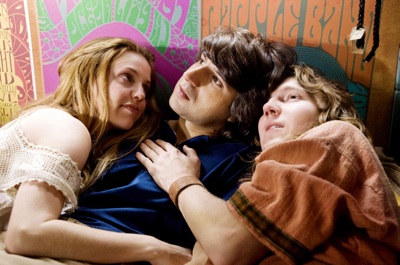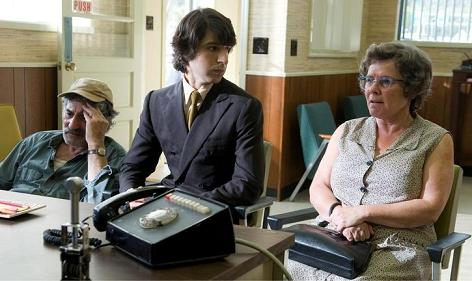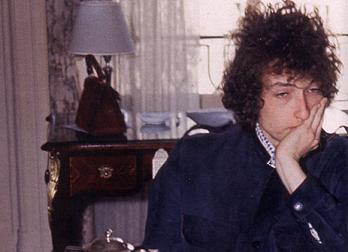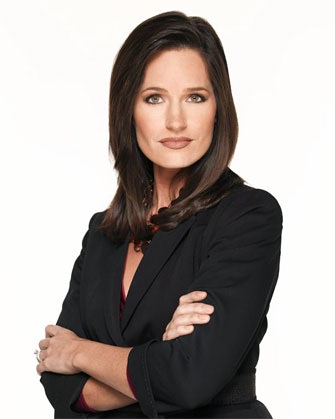In the late 1960s there were young people in college and starting families, young people far from home fighting and dying for the sovereignty of our allies in Vietnam, young people just starting to see results from their brave and noble fight for Civil Rights, and then there were the dirty, filthy hippies – the most spoiled, narcissistic, ungrateful species in the history of mankind – whose legacy of drug addiction, STDs, the misery of single motherhood and 2 million left dead on the Killing Fields of Cambodia, still reverberates forty years on.
Ang Lee’s “Taking Woodstock,” a halfway competent but ultimately erratic, unfocused story of how “three days of peace and music” came to the small town of White Lake, New York and changed for the better the lives of those who embraced “the spirit,” not only celebrates the drug abuse and loveless sex that defined the “Woodstock Generation,” but goes beyond caricatures and into outright anti-Semitism to condemn those who didn’t.
Elliot Tiber (Demetri Martin), a young Jewish man in his early twenties, once again abandons his work as a struggling Greenwich Village artist to help his elderly parents (two Jewish stereotypes played by Henry Goodman and Imelda Staunton) through another summer season in the Catskills. Their “resort,” a filthy, dilapidated motel, is about to be foreclosed on and probably should be, but Elliott convinces an exasperated banker to give him one more season. But foreclosure is inevitable and Elliot knows it, and while his friends go to San Francisco with flowers in their hair, his dreams take a back seat to this annual guilt trip sponsored by his overbearing mother.
There are probably enough seasonal tourists to make for a nice profitable business. The problem is mom and dad. Her iron-willed hostility and suspicion towards everyone, her inexplicable cheapness – refusing to even change sheets between guests – chases all kinds of business away. And Dad? Well, he’s too beaten down by her and fatalistic to care.
As a matter of procedure and as President of the local Chamber of Commerce (a tired group of seven or so small business owners who meet in a dark barn), Elliot calls for votes issuing local permits, including one for his own annual music festival — maybe a nice string quartet this year. When the nearby town of Wallkill cancels a major music festival, Elliot begins to understand the power of a one-dollar permit and makes a phone call.
Led by long-haired and oh-so mellow Mike Lang (Jonathan Groff), the Woodstock organizers (hippies backed by a battalion of briefcase-toting lawyers) descend on White Lake in helicopters and limousines with military precision. Lang comes off as a shrewd hustler and mercenary businessman willing to put on a “groovy” front if it means suckering the dumb hippies into believing they’re not making The Man rich, but in the film’s best scenes, he meets his match with Max Yasgur (Eugene Levy), a kind but cunning dairy farmer with the land the festival needs.
The story hits a stride as the organizers move in, hand out bags of cash and with real savvy, manipulate, charm and, when necessary, bribe whoever stands in the way of their harnessing the resources necessary to handle the coming human wave holding those hundred-thousand (and counting) tickets already sold. Through the eyes of Elliott, watching the machinations of the impossible come together is infectious but Ang Lee isn’t interested in having us merely observe. Lines are about to be drawn.
Before Woodstock arrived, living in Elliot’s barn was a starving theatre troupe into the avante garde and the removing of their clothes (translation: untalented bums who spend their food money on drugs and now run the NEA). In a truly ugly scene they put on a performance for the locals, including small children, that ends with them ripping off their clothes and screaming “Racist warmongers!” “Republican c-ksuckers!”
This is not only a turning point for the townspeople but for we the audience. Unforgivable behavior is presented as humorous, and this is just the beginning.
With their town swamped by dirty, filthy hippies, their roads blocks and their lives completely disrupted, Director Lee refuses to give even a hint of humanity to those who oppose Woodstock. They, and therefore we, are instead portrayed as intolerant bigots, the kind who defile a Jewish-owned motel with swastikas and “Die, Faggots Jews.”
In other words, you’re either with Woodstock or you’re against it. And through Elliot we’re shown why we should be with it. In a sloppily structured subplot, Elliot finds his inner homosexual and beds down with a burly construction worker and later will enjoy an acid-infused, bi-sexual ménage a trois in the back of a van that’s so enlightening and liberating, man, he finally works up the nerve to find his true narcissism, tell his parents to back off and go pursue his own dreams.
The military takes its usual beating. Emile Hirsch plays Billy, a vet just back from the ‘Nam, man, and riddled with PTSD. The “good” Marine is played by Liev Schreiber … in a long blond wig, pumps and a dress. Of course, Schreiber’s character is the Obi Wan Kenobi of the story, the wise and brave one, the only one who’s got it all together because he’s true to who he really is.
Fine, whatever, right? A movie about Woodstock from this Hollywood is bound to do a clunky, overbearing job attempting to mythologize an event so morally appalling God turned on the sprinklers to get the shit off His lawn. But the portrayal of Elliot’s mother is something else … by far the ugliest Jewish stereotype you’ve seen in a long time.
**Spoiler**
“Money-grubbing Jew.” That’s not figurative in “Taking Woodstock,” it’s literal. This horribly cheap woman who milks every penny from her customers, overcharges at every opportunity and uses the Holocaust to guilt the world, literally hoards money below the floor boards at the expense of the well-being of her own family. And when we leave her, she’s literally lying in bundles of bills, grasping them, claiming them for her own. The image is revolting, the heavy-handed symbolism amateurish, and the whole film just another excessive exercise in self-involved, baby boomer masturbation.




COMMENTS
Please let us know if you're having issues with commenting.